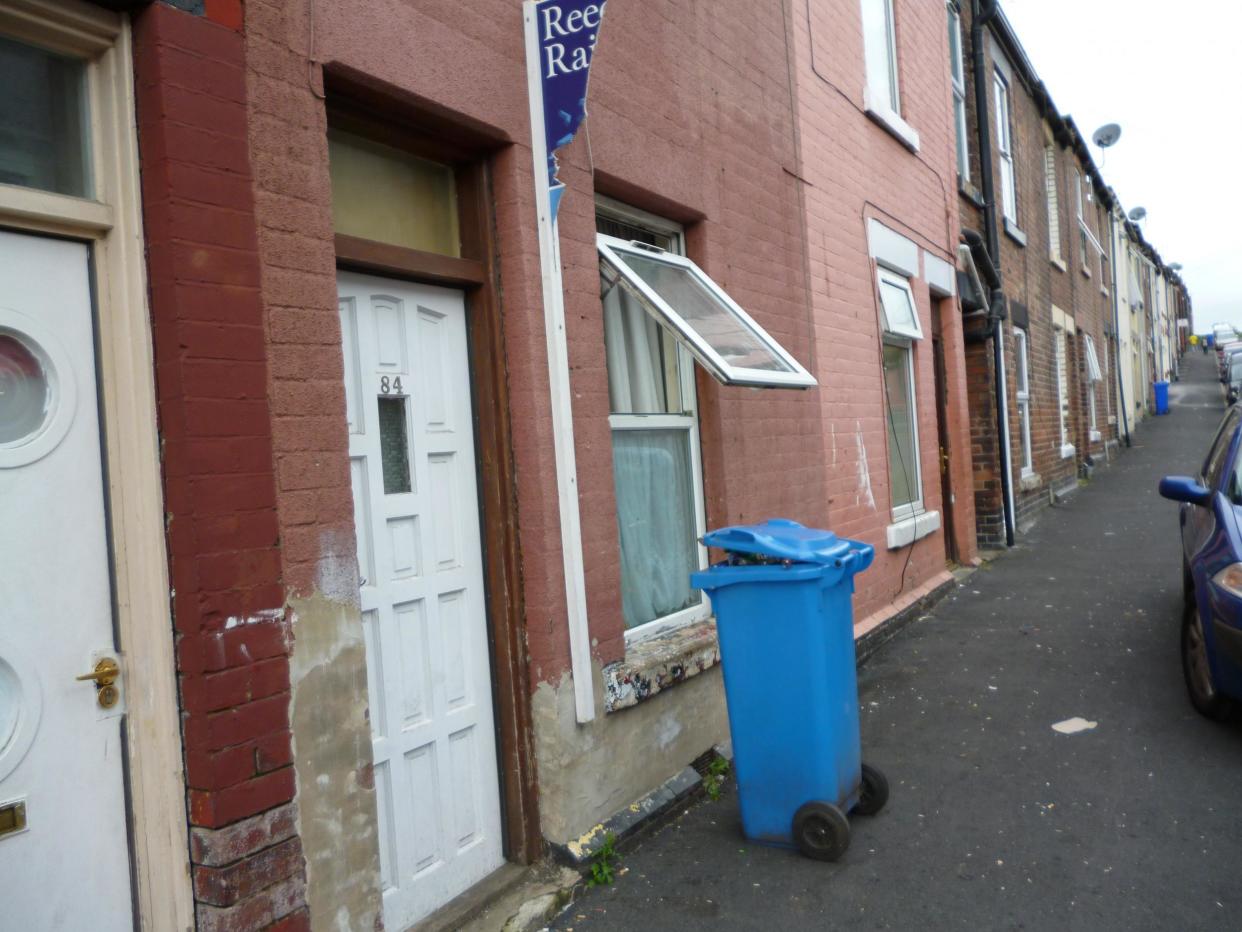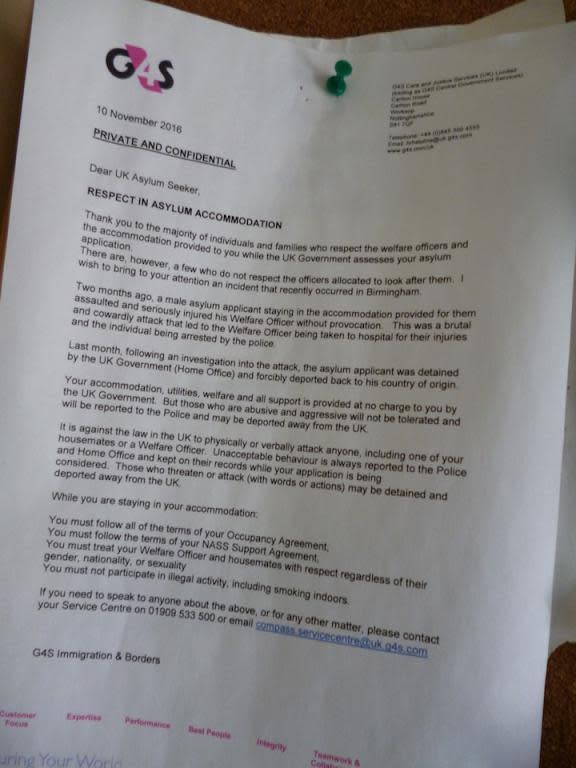G4S warns asylum seekers ‘behave or be deported’ in potential breach of law

Asylum seekers have been warned by private security company G4S to behave in their accommodation or risk being "detained and deported", in what lawyers have said is a misrepresentation of the company's powers and a potential breach of their duty of care.
A letter from G4S warns that people living in asylum-seeker housing managed by the company “may be detained and deported away from the UK” if they show “unacceptable behaviour” while residing in the accommodation.

Lawyers have criticised the company for over-stating their powers, describing the letter as “even worse” than the security company’s widely criticised move to paint the doors of asylum housing in Middlesbrough red last year.
The letter, which is dated November 2016 but was only brought to the attention of an individual case worker last month, begins by thanking “the majority of tenants” who respect G4S staff, then goes on to state: “There are, however, a few who do not respect the officers allocated to look after them.”
It reports “a brutal and cowardly attack” by an asylum tenant on a G4S officer in Birmingham, which resulted in the officer being hospitalised and the asylum seeker being arrested and “forcibly deported back to his country of origin”.
G4S then warns that tenants who “are abusive and aggressive will not be tolerated and will be reported to the Police and may be deported away from the UK”.
It states: “Your accommodation, utilities, welfare and all support is provided at no charge to you by the UK Government. But those who are abusive and aggressive will not be tolerated and will be reported to the Police and may be deported away from the UK.
“It is against the law in the UK to physically or verbally attack anyone, including one of your housemates or a Welfare Officer. Unacceptable behaviour is always reported to the Police and Home Office and kept on their records while your application is being considered.
“Those who threaten or attack (with words of actions) may be detained and deported away from the UK.”
When contacted about the letter, G4S conceded that the language used in the letter is “emotive and imprecise” and that future communications with asylum seekers will be “expressed more clearly” — adding that the number of asylum seekers who are violent or abusive was “small”.
Frances Webber, retired immigration barrister and vice-chair of the Institute of Race Relations, told The Independent G4S had breached their duty of care towards asylum seekers under their charge by issuing such a threat, warning that it could have "horrendous consequences" on vulnerable people's wellbeing.
“G4S hasn’t been given the job of deciding who gets deported. It’s a terrible threat. A lot of asylum seekers who have killed themselves in recent years are those who have been threatened with deportation. It has horrendous consequences, and you can see these security employees of G4S don't have a clue, uttering such threats," said Ms Webber.
“It’s in breach of the common law duty of care, which they have as owners of managers of asylum property. It’s definitely in breach of a duty of care that they would have to the people in the charge and in their care.
“They are perfectly entitled, as would anybody running asylum property, to say if you break the rules or if you commit a criminal offence, you will be reported to the police. What they’re not entitled to do is to go on and say you might be deported. That’s absolutely, completely out of order.
“Using the word ‘deportation’ is emotive. It causes huge anxiety unnecessarily and improperly, and if somebody in receipt of that self-harmed, I would imagine that they would be liable. If I was advising somebody as a lawyer who was adversely affected by a notice like that, then I would say there is a common law duty of care in that situation, which they are in breach of."
Ms Webber went on to say the threats were “even worse” than the scandal when the company painted the doors of asylum seeker housing red, because it was the potential harm was more “direct”.
“They are behaving like security guards, and if they want to branch out into this care provision, which they have begun to do, they need to recognise that that is a different role. It’s not supposed to be penal,” she said.
“This is similar to the case where G4S painted asylum seekers’ doors red, but it’s even worse in a way because it’s more direct. It’s very direct harm.”
Immigration lawyers from the firm Duncan Lewis, meanwhile, said they were "very concerned" by the the threats, saying it was "entirely wrong" to issue such warnings based on the actions of one individual and accusing the company of "misrepresenting their powers".
Jamie Bell, of the public law department at Duncan Lewis, said: "G4S do not have the right to recommend deportation and have no involvement in the immigration cases of anyone who lives in their properties. It is a misrepresentation of their powers.
"It is entirely wrong for G4S to threaten innocent people with deportation based on the actions of one individual. Individuals who are being provided accommodation by G4S are often extremely vulnerable individuals who have undergone harrowing incidents in their home countries, causing them to flee and seek refuge in United Kingdom. Making empty threats like these can be potentially psychologically damaging to those who have acute fear of return.
"This recent news comes within a continued climate of ill-treatment towards refugees by the Home Office including recent instances of deaths in Immigration Removal Centres, the lengthy detention of vulnerable individuals and the treatment of those subjected to forced removal. We would urge the Home Office to treat these men and women with the respect that they deserve."
John Grayson, the independent case worker who discovered the letter pinned on a notice board at an asylum seeker house in Sheffield before writing about it on the openDemocracy website, described the letter as "brutal".
“I see loads of notices up in the G4S houses, but this one was particularly brutal. It was stark and brutal. The threat to actually deport people without any question of the criminal justice system," said Mr Grayson.
"If someone assaults a G4S officer, they might have to go to prison, but that’s a decision for the independent judiciary and should not affect their immigration status, nor should it be decided by G4S telling the Home Office to send them down and then deport them.
“For years I’ve denied the idea that G4S collaborates or actively supports this deportation without any kind of recourse to the legal processes. But this letter effectively says they do. It’s very much part of the hostile environment in the UK asylum system."
When asked about the letter, a G4S spokesman said: “We acknowledge that the language used in this letter was unhelpful and imprecise, however it followed a serious attack on one of our welfare officers that left them badly injured and fearful of returning to work.
"Our teams have no influence on the course of an asylum seeker's application and will ensure our future communications are clearer. We have a responsibility to remind the small number of asylum seekers who are violent or abusive that their conduct will be referred to the Home Office and the police.
"This fulfils our duty of care to the safety of our colleagues and we also believe that it is what the public would expect."

 Yahoo News
Yahoo News 
